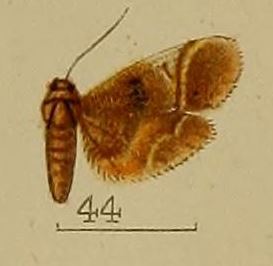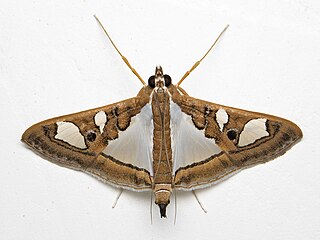
The white-rumped vulture is an Old World vulture native to South and Southeast Asia. It has been listed as Critically Endangered on the IUCN Red List since 2000, as the population severely declined. White-rumped vultures die of kidney failure caused by diclofenac poisoning. In the 1980s, the global population was estimated at several million individuals, and it was thought to be "the most abundant large bird of prey in the world". As of 2021, the global population was estimated at less than 6,000 mature individuals.

The leopard cat is a small wild cat native to continental South, Southeast, and East Asia. Since 2002 it has been listed as Least Concern on the IUCN Red List as it is widely distributed although threatened by habitat loss and hunting in parts of its range.

Massepha is a genus of moths of the family Crambidae.
Rakhine Yoma Elephant Range is a protected area in Myanmar's Rakhine Yoma mountains, covering about 1,756 km2 (678 sq mi) of evergreen and mixed deciduous forest at an elevation of 20–1,270 m (66–4,167 ft).

Elophila fulvalis is a moth in the family Crambidae. It was described by George Hampson in 1899. It is found in South America, where it has been recorded from Paraná, Brazil.
Massepha absolutalis is a moth in the family Crambidae. It was described by Francis Walker in 1859. It is found in Sri Lanka and India.
Massepha ambialis is a moth in the family Crambidae. It was described by George Hampson in 1903. It is found in India.
Massepha asiusalis is a moth in the family Crambidae. It was described by Francis Walker in 1859. It is found in Rio de Janeiro, Brazil.
Dolicharthria carbonalis is a moth in the family Crambidae. It was described by Warren in 1896. It is found in India (Assam).
Massepha entephriadia is a moth in the family Crambidae. It was described by George Hampson in 1898. It is found in Nigeria.
Massepha flavimaculata is a moth in the family Crambidae. It was described by Max Gaede in 1917. It is found in Equatorial Guinea.
Massepha gracilis is a moth in the family Crambidae. It was described by George Hampson in 1899. It is found in Brazil.
Massepha grammalis is a moth in the family Crambidae. It was described by Achille Guenée in 1854. It is found in Panama and French Guiana.
Massepha longipennis is a moth in the family Crambidae. It was described by George Hampson in 1912. It is found in Cameroon.
Massepha lupa is a moth in the family Crambidae. It was described by Herbert Druce in 1899. It is found in Honduras, Guatemala and Trinidad.

Massepha rufescens is a moth in the family Crambidae. It was described by George Hampson in 1912. It is found in Tamil Nadu, India.
Massepha syngamiodes is a moth in the family Crambidae. It was described by George Hampson in 1912. It is found in Argentina.
Massepha tessmanni is a moth in the family Crambidae. It was described by Max Gaede in 1917. It is found in Cameroon and Equatorial Guinea.
Massepha grisealis is a moth in the family Crambidae. It was described by George Hampson in 1917. It is found in Ghana.

Spilomelini is a tribe of the species-rich subfamily Spilomelinae in the pyraloid moth family Crambidae. The tribe was erected by Achille Guenée in 1854.


